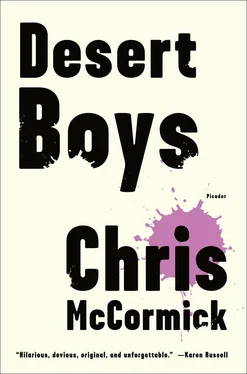“Hey, this is actually perfect,” Teresa said. “Daley and Daniel probably want to spend some time together this trip, right? This way they can do that without you having to sacrifice any time with your son, no?”
I couldn’t pin down why Teresa was being so pushy. Did she want to have dinner with us, or was she simply competing in a mom-off, where the object of the game was to embarrass the other mother with sweet, undying insistence? Had Watts put her up to this?
“Oh,” Teresa went on, affecting a pained sympathy. “Tomorrow night’s probably too short notice for you.”
“You know,” my mom said, planting her feet. “Tomorrow night should be perfect.”
“Okay, great,” Teresa said. “I’ll make sure my son will be available. He’s in school, too, I’m sure you know. Summer school, even, for the emergency medical training.”
“That’s right,” my mom said, seeing an opening. “And I’m sure he’s saving a lot of money by staying home and going to the junior college.”
“He is,” Teresa said. She widened her stance and shifted her braid to the other side. “It’s a good thing he doesn’t have to take out all those loans you see in the news, crippling loans students can never pay back.”
“I look at it this way,” my mom said. “A loan is just a bet we place on ourselves.”
“True,” said Teresa, “but gambling can be a vice.”
The conversation went on this way for a few minutes, during which I found a suitable pair of flip-flops. After Teresa left, my mom pretended to look at the small selection of jewelry at the front counter, giving her enough time so that we didn’t run into Teresa again in the parking lot. When the coast was clear, we got back in the car.
* * *
At lunch, my dad had some bad news for my mom, who was in the middle of an enthusiastic pitch for the next night’s dinner plans: He wouldn’t be able to make it. “Tomorrow,” he said, “there’s supposed to be some kind of rally on the Boulevard. Apparently, tons of people are going to be in town all weekend, so we’re being asked to work late. I guess my boss thinks the protesters will finish marching, turn to each other, and in one passionate voice declare, ‘Now let’s buy some furniture!’”
My mom didn’t laugh or even seem to hear him, clearly plotting what she was going to say to Teresa about her missing husband. Would appearing without him prove that she was somehow an inferior wife? Could she tactfully back out of the plans?
While my mom’s machinery was at work, I asked my dad about the rally on the Boulevard.
“I heard it has something to do with zoning issues,” he said, his confidence waning with every word, “or a new business park development? The environment? I don’t really know, to be frank.” He resumed chewing the last of his burger. As a kid in Michigan, he’d been hit by a car while riding his bike, and had to have his jaw reset. Now every time he bit down, I could hear a snap. After the last snap, we got up and said good-bye.
My mom and I were stuck at another achingly long red light on the drive home. As casually as I could, I asked why she didn’t seem to like Teresa Watts.
“What?” She turned in the driver’s seat to face me, genuinely wounded. “I have nothing but respect for Teresa.”
I said I didn’t mean any harm. From the outside, I explained, the two of them seemed to give off a kind of competitive, unfriendly vibe.
“We’re mothers,” she said. “We believe our sons are the best. And we know there can only be one best.” After we traveled a few feet closer to the stalled intersection, she put the car in park — good for the brakes, she claimed — and pulled her short legs beneath her on the seat. “Stop acting like your father,” she said. “All these questions. You’re integrating me.”
“I don’t mean to interrogate you,” I said.
At home, I changed into my trunks and glided splashlessly back into the pool. I could hear my mother in the driveway out front, hosing down the car. Not just the desert, but all of California was in a severe drought, and as I lay floating on my back, I felt immensely guilty, remembering an old teacher of mine, a farmer, who’d once made us draw bar codes on our faucets to remember that water wasn’t free. But the guilt, as always, passed. I hoped tomorrow’s rally was in the spirit of environmentalism, but soon the hope passed, too, and I simply floated, focusing on nothing at all but my own breathing.
* * *
Saturday. In the kitchen, my mother grated cheese for a stuffed pastry called, depending on the dialect your kind of Armenian speaks, boreg or borek . My mom pronounced it with a hard g —so I did, too, and it was one of the twenty or thirty words in the language I spoke with any confidence. I used the word now as a replacement for hello.
“Good morning,” my mom said, taking a break to kiss me and then returning to her work. “I called in sick again so we could be together.”
“You weren’t supposed to make anything for tonight,” I said, stealing a pinch of shredded cheese from a growing mountain of the stuff. “It’s Teresa’s dinner party.”
“Just something small,” she said. She moved to the oven to check the bulb labeled PREHEATED. “Most of this is for us, but we’ll take a few over. Those Mexicans love anything with a lot of cheese, I think.”
“Mom,” I said, reflexively offended. But she hadn’t said anything foul, really, except for the unnecessary inclusion of the word “those,” so I left it at that.
“You’re already dressed,” she noticed. “You have plans?”
The answer was yes. I’d decided to go to the rally on the Boulevard as soon as my dad mentioned it. I couldn’t imagine what a political rally would look like in a place where everybody’s politics aligned. I had to see for myself.
“You have to stay and be my taste tester,” my mom said.
“I’m sure they’ll be as delicious as they always are,” I said, which was true. “But my boss at the newspaper emailed me.” A lie. “He said I should go to that rally on the Boulevard and take notes for a feature. I’m heading out now, actually.”
“You’re going by yourself?” The way she spoke — accusatory and bewildered all at once — made going to the rally alone seem like the most ridiculous thing in the world. And so, for the second time in as many responses, I lied.
“An old friend is one of the organizers.”
“A girl or a boy?”
“A girl,” I said, knowing she’d prefer it that way.
“Why doesn’t she just come here after the event? I can make tea, and you two can sit by the pool. I won’t bother you.”
“Well, we’re doing something,” I said. “We’re not just sitting around, talking.”
“Talking is doing,” she said. Then—“Ugh”—she nicked the top of her thumb against the grater, sucked the shallow wound, and, leaving her fist against her mouth, grumbled, “What is this rally, anyway?”
I went to the drawer where we kept the Band-Aids and peeled one from its packaging. “Immigration reform,” I guessed, taking her cut hand in mine.
“Not too tight,” she said. I kept my attention on her thumb, but I could feel her looking at my face. All my life she’d paid a comical amount of attention to me, but this trip was the first time I felt as though she were studying me, analyzing my every move, for … for what? I couldn’t say. I finished applying the Band-Aid without looking her in the face.
“What immigration?” she said.
I went to the trash can under the sink to throw away the wrapper. But the trash can had moved since the last time I was home. Now it stood near the sliding glass doors that opened out onto the backyard. “Oh, you know,” I said, strangely disoriented. “The rights of immigrants, I’m assuming. The stuff you hear about in the news every other year.”
Читать дальше












